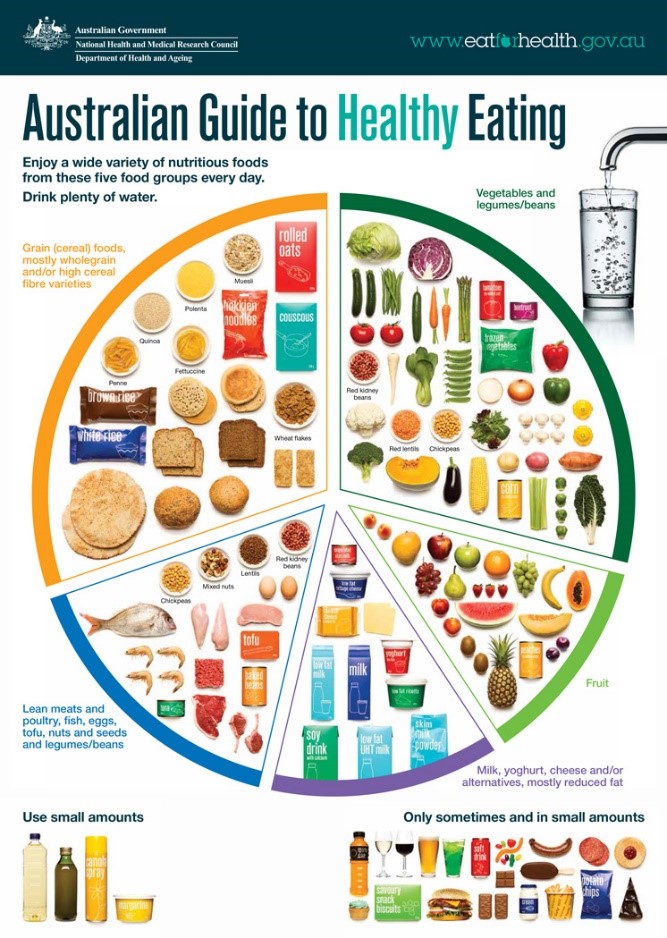Nutrition describes the contribution of the nutrients in foods to our overall health.
It includes food intake, absorption, assimilation, biosynthesis, catabolism, and excretion.
Every food we eat affects and contributes to our body and our health in some way. The effect can be instant, such as feeling energised or ready to move, or feeling lethargic and sleepy; or it can be long term – leading to weight gain or heart disease. Regardless, everything we eat contains nutrients which the body processes in different ways.
Some foods are more nutritious or have a higher nutrient density than others. For example, a cheese and salad sandwich for lunch has more macronutrients (i.e. carbohydrate, protein and some fat) and micronutrients (i.e. vitamins and minerals such as calcium) than a sausage roll (i.e. some carbohydrate and protein, but a lot of fat). Thus the sausage roll is more energy-dense than nutrient-dense.
How are nutrition and overall health linked?
Before we are even born what we eat influences our development. And from the first moments after we are born, when we first breastfeed, nutrition is linked to our health. That first feed influences what we call our microbiome. The microbiome is the road map that helps program us for the future; containing the genetic information that tells our body how to function, digest food and protect us from disease.
Our diet regulates our microbiome. What we eat determines the millions of microorganisms and bacterium which grow in our gut. Since our diet has evolved from hunter-gatherer farmed foods to consuming more industrialised processed foods; our gut microbiota has changed. and the prevalence of chronic and metabolic diseases has risen. Thus, eating more nutritious foods increases the nutrients available in our body to function, which helps us achieve optimum health.
As we go on to grow and develop into children, young adults and older adults, what we eat will influence our development at that stage of our lives.
What does a healthy and balanced diet look like for children?
Eating a wide variety of nutritious foods ensures children are getting enough nutrients for optimal health, growth and development. Children should also drink plenty of water and engage in play and physical activity every day.
 Children require a healthy and varied diet eating from the five main food groups every day:
Children require a healthy and varied diet eating from the five main food groups every day:
- Fruits
- Vegetables and legumes
- Cereals (including breads, rice, pasta and noodles), mostly wholegrain
- Lean meat, fish, poultry and/or alternatives
- Milk, yoghurt, cheese and/or alternatives, mostly reduced fat (not recommended for children under 2 years).
Consumption of non-essential foods, including chips, processed meats and sausages, fried foods, ice-cream, confectionery and chocolate, should be limited to small amounts and eaten only occasionally.
Drinks other than water or milk – including soft drinks, cordials, energy drinks, vitamin waters and juices – should also be limited. Most of these foods and drinks are high in sugar, fat, and salt; and too much can lead to children becoming overweight, and increase the risk of tooth decay.
What should parents do if they think their child is overweight?
Give them breakfast every day
Researchers at the University of Sydney found there was a strong positive relationship between children skipping breakfast and being overweight. Additionally, a 2015 Australian study found that children who skip breakfast are twice as likely to get ‘hangry’ (hungry and angry) while at school.
Therefore, giving children breakfast every day is an easy and important way to support their overall development.
Eat together as a family at the dinner table
When people eat as a family they tend to include a wide variety of different foods, from all the main food groups. Also, it is best to avoid eating in front of the TV because it can interrupt the signals our body uses to recognise when it’s hungry and full.
This distraction can lead to continuing to eat past fullness and result in overeating and weight gain.
Drink only water and milk at home (and pack only water for school lunch boxes)
Drinking tap water is important for all the bodily functions that keep us healthy. Our body is made up of around 75 per cent water so we need to make sure we keep replacing the water we lose each day. That means children should drink around 1 to 1.5 litres per day.
Tap water also contains fluoride, an important mineral for strong teeth and bones. Avoid giving children juice, cordial or soft drink as it can damage their teeth and increase their energy intake unnecessarily. A better option is milk – a good source of calcium, which is essential for growth and development.
Remove calorie-rich temptations and processed food from your pantry
Having unhealthy snacks such as chocolate, chips and soft drink available in your pantry increases the chance your children will choose them. It’s important these foods aren’t the norm but are kept for special occasions.
Providing more nutritious snacks also keeps children fuller for longer and helps meet their nutrient requirements. Some healthy snack ideas include:
- Cut up small pieces of fruit (grapes and apples)
- Cut up raw or cooked vegetables (carrot sticks or steamed broccoli)
- Plain home-made popcorn
- Yoghurt (freeze as an icy pole for hot days)
- Wholegrain crackers
- Cheese
- Nuts
Involve children in grocery shopping and cooking
Involving children in all aspects of eating healthy will help to give them practical skills for the future. For example, get them involved in choosing meals for the week, writing down ingredients, grocery shopping and cooking.
Some tips for engaging children at the supermarket include:
- Asking children to choose the best… (insert fruit or vegetable here)
- Reading the ingredient list to see which yoghurt or ice-cream has the least amount of fat or sugar (ingredients are listed highest to lowest amounts)
- Reading the Nutrient Information Panel (best for older children, comparing the amount of fat and sugar per 100g between products)
How can parents support fussy eaters?
Fussy eating is a normal phase of development. As children grow, their appetite changes and they become more aware of the shapes, taste, texture, colours of food. Most of the time, children are exploring their environment and trying to make their own choices.
Fussy eating generally happens less as children become older. The goal is to create a safe, fun and responsive feeding environment in line with a child’s readiness.
Parents can support fussy-eaters by:
- Having regular positive meal times
- Eating together – be a role model and provide nutrition education
- Eating ‘family foods’ – having everyone eat the same food i.e., avoiding ‘kids food’ or ‘parent foods’
- Avoid using food as a reward, bribe and/or punishment
- Avoiding distractions – e.g., turning off the TV and any screen-based distractions
- Offering choices, within limits – try to provide healthy options and let children choose while aiming for the five core food groups
- Don’t force (physically or emotionally) children to eat everything served
- Giving children independence – picking a recipe, serving and feeding themselves, helping with shopping and cooking.
Remember: If you keep presenting food positively, any interaction with food is good, even sometimes throwing food away. Most importantly celebrate the small efforts made when the child tries a new food.
Should children take vitamin supplements?
Simply put – no. Children who are not on a restricted diet or who do not have a medical condition should not need to take vitamin supplements. While they do need the essential vitamins and minerals to support their growth and development, the best way to achieve this is through a healthy and well-balanced diet.
This is because vitamins and minerals are more highly absorbed when found in food rather than supplements, which can often be bound to other compounds that are not absorbed easily. Although chewable vitamins can seem like a good option for fussy children, they are not effective and don’t support life-long habits of healthy eating.
There are some exceptions where children may need to take vitamins or supplements, for example, when children have allergies, diseases and/or special diets. It is best to consult with an Accredited Practicing Dietitian so the appropriate supplements in the right amounts are provided.
Our research impact
Impact of early nutrition on health
As part of the Raine Study, our nutrition researchers have been investigating a variety of nutritional factors, from early infant feeding up to adolescent diets, in order to understand the impact of early nutrition on later health. Findings have included:
- Dietary assessments of participants at 17 years of age showed teenagers consumed less than the recommended amount of calcium, magnesium, folate, vitamin D and vitamin E
- B vitamins can affect the mental health and behaviour of teenagers
- A Western dietary pattern (high in takeaway foods, red and processed meat, soft drink and fried and refined foods) has been associated with poorer cognition in adolescents
- A lower fructose diet may help to protect adolescents with obesity from fatty liver disease.
Sugary drinks - Our researchers also have been investigating the dangers of sugary drinks. They found teenagers who drank more than one standard can of sugary drinks a day had lower levels of 'good cholesterol' and higher levels of the ‘bad' triglyceride form of fat in their blood.
Other studies showed that sugary drinks have a role to play in the increased risk of liver disease in teenagers, and that there was a significant link between the consumption of energy drinks and anxiety levels in young men.
Breastfeeding
Breastfeeding is the most optimal and important start to life. Extended breastfeeding will reduce the likelihood of a child developing ear and chest infections, asthma, and obesity and diabetes both as an adult and child. However, breastfeeding can sometimes be problematic – including when a breastfeeding mother consumes alcohol.
Recently The Kids Research Institute Australia researcher Dr Roslyn Giglia investigated whether maternal health professionals knew of the disruptive effect alcohol has on breastfeeding hormones, and whether they were aware of the national recommendations for drinking alcohol while still breastfeeding.
The research found few of the health professionals who participated in the study were aware of the problems alcohol can cause for breastfeeding women and their infant. They also were not aware of the national recommendations around alcohol and breastfeeding.
Work has begun to try and turn these results around via education and training of health professionals. The Institute has also had input into the up and coming review of the national NHMRC Australian alcohol guidelines.


